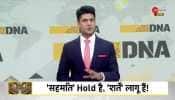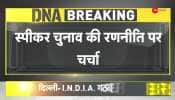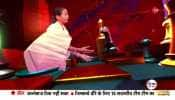New Delhi: Pushing for an atomic weapons free world, Congress MP Mani Shankar Aiyar on Friday said he was in discussions with experts from Pakistan and China to launch
a Track-II process on universal nuclear disarmament.
"I am in discussions with Chinese and Pakistani experts
to have a trialogue on universal nuclear disarmament," on a
discussion on the `Report of the Prime Minister`s Group on
Nuclear Disarmament`.
Aiyar, who chairs an Informal Group which prepared the
report, said he wanted a purely intellectual track to pursue
universal, time-bound, phased and verifiable disarmament.
The former union minister would be delivering a lecture
in Pakistan very soon on the possibility of cooperation in
nuclear disarmament.
He said there was "far greater congruence" between India
and Pakistan on issues like global nuclear disarmament.
"The disagreements are only with each other," Aiyar said
pointing out that it would be difficult to differentiate
between the speeches of Indian and Pakistani diplomats on
disarmament at multi-lateral fora.
He said the Rajiv Gandhi Action Plan on disarmament had
bipartisan support in the country as the NDA, during its
six-year rule, had never repudiated the former Prime
Minister`s vision.
Earlier, Aiyar also met External Affairs Minister S M
Krishna who said that the value of the Report was in wider
disemmination within the country to generate discussion and
debate about universal nuclear disarmament.
Krishna also offered to support a seminal under the aegis
of the Indian Council of World Affairs on the theme of global
universal disarmament to coincide with Rajiv Gandhi`s birth
anniversary on August 20.
Earlier, Vidya Shankar Aiyar, advisor to the Group, made
a brief presentation on the report which suggests that India
should assume a high profile in advocating the basic ideas and
goals of complete disarmament put forth by Prime Minister
Rajiv Gandhi at the UN in 1988.
The report also underscored the vitality and relevance of
the RGAP for Ushering in a Nuclear Weapons Free and
Non-Violent World.
"In 1988, India had to go it alone. The difference today
is that not only the civil society groups in nuclear weapons
states are very active in advocating disarmament but their
eminence is also increasing on a day-to-day basis," Aiyar
said.
He said India as a nuclear weapons state is better suited
to champion the elimination of nuclear weapons.
Suggesting a seven-point roadmap for carrying forward the
RGAP, the report had asked the government to reiterate its
commitment to the goal of complete disarmament and to
eliminate its own arsenal as part of a universal,
non-discriminatory and verifiable global process.
It has also asked the government to encourage non-nuclear
weapons states and states with nuclear weapons to make a
similar undertaking.
The Group has made 14 recommendations that entail India
taking a leadership role on disarmament issues in various
global fora, including the UN, the Non-Aligned Movement and
the Conference on Disarmament, with a view to launching
multilateral negotiations for the complete elimination of
nuclear weapons.
PTI















